|
U.S. Senate votes unanimously to beef up broadcasts to Iran
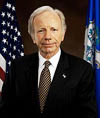 WASHINGTON, D.C. (Press Release) - The Senate voted unanimously Thursday night to adopt bipartisan legislation that will help strengthen the ability of the Iranian people get access to news and information and overcome the electronic censorship and monitoring efforts of the Iranian regime. WASHINGTON, D.C. (Press Release) - The Senate voted unanimously Thursday night to adopt bipartisan legislation that will help strengthen the ability of the Iranian people get access to news and information and overcome the electronic censorship and monitoring efforts of the Iranian regime.
The Victims of Iranian Censorship (VOICE) Act was introduced by Senators John McCain (Republican, Arizona), Joseph Lieberman (Independent, Connecticut, above right), Ted Kaufman (Democrat, Deleware), Lindsey Graham (Republican-South Carolina), and Robert Casey (Democrat, Pennsylvania) as an amendment to the National Defense Authorization Act. Among the key features of the VOICE Act:
Authorizes $30 million to the Broadcasting Board of Governors to expand Farsi language broadcasting into Iran by Radio Free Europe / Radio Liberty's Radio Farda and the Voice of America's Persian News Network. The funds may be used to develop additional transmission capability to counter Iranian government efforts to jam radio, satellite, and Internet-based transmissions; establish additional proxy server capability and anti-censorship software to counter efforts to block access to websites in Iran; develop technologies to counter efforts to block SMS text message exchange over cellular phone networks; and hire, on a permanent or short-term basis, additional staff for Radio Farda and the Persian News Network.
Authorizes $20 million for a new "Iranian Electronic Education, Exchange, and Media Fund," which will support the development of technologies, including websites, that will aid the ability of the Iranian people to gain access to and share information; counter efforts to block, censor, or monitor the Internet in Iran; and engage in Internet-based education programs and other exchanges with Americans online.
Requires a report by the President on non-Iranian companies, including corporations with U.S. subsidiaries, that have aided the Iranian government's Internet censorship efforts, including by providing deep packet inspection technology.
Authorizes $5 million for the Secretary of State to document, collect, and dissemination information about human rights in Iran, including abuses of human rights that have taken place since the June 12 Iranian election.
"The world has been astonished and inspired by the courage of millions of Iranians pressing their regime for nothing more than their inalienable rights," said Senator John McCain. "The Iranian government has taken numerous steps to stop these citizens from communicating with each other and with the outside world. As this cruel regime works to close off Iranian society, the VOICE Act, by providing assistance for broadcasting and new internet and communications technologies, will help to open it up."
"In the wake of the June 12 election in Iran, we saw powerful proof of how technology can empower millions of ordinary people in the face of a repressive regime," said Senator Lieberman. "The VOICE Act will help the Iranian people stay one step ahead of their regime, in getting access to information and safely exercising freedom of speech, assembly, and expression online."
"While the people of Iran enthusiastically participated in the June 12 elections, it is painfully clear that the long road to democracy does not end there, as the government has infringed on the universal principles of freedom of expression and press," said Senator Kaufman. "Our bill supports the Iranian people as they take steps to peacefully express their opinions and aspirations and seek access to news and means of communication, especially over the Internet."
"Now is the time to come to the aid of the Iranian people," said Senator Graham. "We must deny the regime the tools they desperately need to continue repressing their own people. Our nation has a long history of providing assistance to those who wish to live free. During the Cold War, our efforts made a substantial difference and I believe we can have the same effect today as the Iranian people work to replace a repressive theocracy."
"The United States has no quarrel with the Iranian people," said Senator Casey. "We share their aspirations for greater access to all information so that they can make their own judgments free of censorship and repression. Passage of this amendment puts the U.S. Senate on record in favor of strengthening those fundamental freedoms all Iranians deserve, no matter who their government is."
Rabbi Saperstein lauds defeat of concealed gun amendment
 WASHINGTON, D.C. (Press Release)— In response to Wednesday's Senate vote defeating Amendment No. 1618 to the Defense Authorization Bill (S. 1390), an amendment addressing concealed carry permits, Rabbi David Saperstein, Director of the Religious Action Center (at right), issued the following statement: WASHINGTON, D.C. (Press Release)— In response to Wednesday's Senate vote defeating Amendment No. 1618 to the Defense Authorization Bill (S. 1390), an amendment addressing concealed carry permits, Rabbi David Saperstein, Director of the Religious Action Center (at right), issued the following statement:
"We celebrate the outcome of today’s Senate vote defeating Amendment No. 1618 to the Defense Authorization Bill (S. 1390), which would have forced states to recognize and respect concealed carry permits issued by other states. Passage of this dangerous amendment would have reduced concealed carry permit regulations to the “lowest common denominator,” risking the safety and well-being of individuals in states with strong, intentionally passed gun control laws.
"This year alone, there have been three confirmed mass shootings by concealed carry permit holders, many of whom obtain their permits through states’ weak background check laws and incomplete criminal and mental illness databases. States and cities that have tougher gun control laws than their neighbors ought not to be forced to lower their standards. With more than 30,000 Americans dying each year as a result of gun violence, we must renew our commitment to strengthen America’s gun laws and refuse to allow this senseless loss of life to continue.
"Today’s legislative victory reinvigorates us in the fight for stricter gun control laws. The next target of the gun control community will be passage of national legislation to close the so-called “gun show loophole” by requiring stringent Brady background checks on all gun purchases. Hopefully this victory will give momentum to efforts of the administration, Congress and the gun control advocacy community to enact strong and safe gun control measures, like this one, that will protect the sanctity and value of human life."
Cantor says Republican plan will provide'smart regulation... not more regulation' of economy
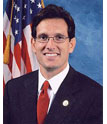 WASHINGTON, D.C (Press Release). – Republican Whip Eric Cantor (Republican-Virginia) on Thursday issued the following statement supporting the introduction of a comprehensive House Republican regulatory reform plan introduced by Financial Services Ranking Member, Rep. Spencer Bachus: WASHINGTON, D.C (Press Release). – Republican Whip Eric Cantor (Republican-Virginia) on Thursday issued the following statement supporting the introduction of a comprehensive House Republican regulatory reform plan introduced by Financial Services Ranking Member, Rep. Spencer Bachus:
"We need smart regulation, not necessarily more regulation. The Administration has placed too much emphasis on government and too little on people. Providing even more power to the same regulators who presided over the market breakdown is not intelligent. The culture of bailouts must stop, and instead of adding yet another layer to the current patchwork regulatory system, we need to bring stability and security back to the market so credit starts flowing and jobs are created.
“Today, thanks to the leadership of Ranking Member Bachus and Republicans on the Financial Services Committee, Republicans are united to reduce uncertainty and to stop the government from picking winners and losers in the marketplace. We want to see market forces return under a set of smart, focused rules to restore financial security for families across this country. We stand ready and willing to work together so that our capital markets can return to prominence, small businesses can access credit, and America starts creating jobs again."
The Consumer Protection and Regulatory Enhancement Act will:
• Provide for the resolution of insolvent non-bank financial institutions — no matter how large or systemically important — through the bankruptcy system.
• Create a Market Stability and Capital Adequacy Board that is charged with monitoring the interactions of various sectors of the financial system, and identifying risks that could endanger the stability and soundness of the system.
• Establish an Office of Consumer Protection, with enhanced authority, within a consolidated regulatory agency to streamline in one place responsibility for rulemaking and enforcement of Federal consumer protection laws.
• Restore the Federal Reserve’s monetary policy mandate by relieving it of current regulatory and supervisory responsibilities.
• End taxpayer subsidies of Fannie Mae and Freddie Mac
• End Federal regulators’ reliance on use of credit rating agencies.
Citizens group contends Rep. Eric Cantor illegally using public funds to build Republican group
WASHINGTON, D.C. (Press Release)- Citizens for Responsibility and Ethics in Washington (CREW) has filed a complaint with the House Office of Congressional Ethics (OCE) requesting an investigation into Rep. Eric Cantor’s (photo at right) recently created organization, the National Council for a New America (NCNA).
NCNA includes an informal member caucus made up of Republican members of Congress, and an associated advisory group consisting of current and former Republican
governors and Sen. John McCain (R-AZ). The group is operated by Rep. Cantor’s office, his staff organized the group and its initial town hall event and created its website, and his spokesman is listed as the group’s contact.
Rep. Cantor has asserted that NCNA’s purpose is to build and improve the Republican Party. Rep. David Dreier (R-CA) said the organization “will help those of us in Republican leadership positions build a Republican Party . . .” Sen. Kay Bailey
Hutchison (R-TX) described NCNA as “a caucus of Congressional leaders gathering the expertise of national leaders and doers in an effort to rebuild and rebrand the
Republican Party.”
House ethics rules prohibit official House resources from being used for campaign or political purposes. Because NCNA appears to be a political organization, CREW has asked OCE to determine whether Rep. Cantor has violated House rules by using his office resources to support NCNA. While Rep. Cantor and others claim NCNA is a legitimate policy organization for which official funds can properly be expended, their statements to the media that the group’s purpose is to rebuild and rebrand the Republican Party belie that claim.
In addition, House rules allow members to hold town hall meetings only in their own districts. As a result, by holding NCNA’s first town hall meeting in Arlington, Virginia, which is not in Rep. Cantor’s district or that of any other NCNA member, Rep. Cantor violated House rules.
CREW Executive Director Melanie Sloan stated, “Applying the old adage: if it walks like a duck and talks like a duck, it probably is a duck, NCNA looks political and Rep. Cantor and the group’s other members talk about it in political terms so it must be a political organization.” Sloan continued, “The real reason Rep. Cantor is disingenuously claiming the group is a policy organization is to leave American taxpayers footing NCNA’s bills. The Office of Congressional Ethics should make it perfectly clear: lawmakers are free to create political organizations, but they can’t use our money to pay for them.”
Levin and McCain team to revise
tax deductions for stock options
 WASHINGTON, D.C. (Press Release) – Citing a mismatch between the treatment of stock options on companies’ books and their taxes, Senators Carl Levin, D-Mich., and John McCain, R-Ariz., on Wednesday introduced legislation to curb excessive corporate tax deductions for stock options WASHINGTON, D.C. (Press Release) – Citing a mismatch between the treatment of stock options on companies’ books and their taxes, Senators Carl Levin, D-Mich., and John McCain, R-Ariz., on Wednesday introduced legislation to curb excessive corporate tax deductions for stock options
“Current stock option accounting and tax rules are out of kilter, leading corporations to report stock option expenses on their financial books at one value, and later on using a different value when claiming an expense on their tax returns,” Levin said. “Stock option tax deductions in excess of book expenses often produce huge tax windfalls for companies that pay their executives with large stock option grants.”
Levin continued, “We should end the double standard of companies deducting more from their taxes than the stock option expenses shown on their books. By eliminating this outdated and excessive corporate tax deduction, we would not only eliminate a tax incentive that encourages corporate boards to hand out huge executive stock option pay, but also ensure that profitable corporations do not use outsized tax deductions to escape paying their fair share of the tax burden. Huge stock option pay fuels the growing chasm between executive pay and the earnings of rank and file workers. The tycoon J.P. Morgan said about a century ago that CEO pay should not exceed 20 times average worker pay. In the United States, average CEO pay recently reached over 400 times average worker pay. Much of that gap is fueled by stock options.”
Stock options give the holder the right to buy company stock at a set price for a specified period of time, often five or ten years. Most U.S. CEOs receive stock options as part of their pay. According to Forbes magazine, in 2008, the CEOs at the 500 largest U.S. companies took home a combined $5.7 billion, averaging $11.4 million each.
This bill, the Ending Excessive Corporate Deductions for Stock Options Act, S. 1491, is the product of an investigation conducted by the Permanent Subcommittee on Investigations, chaired by Levin, into the different book and tax reporting requirements for executive stock options.
Current accounting rules under Financial Accounting Standard 123R require companies to report stock option expenses on financial statements filed with the Securities and Exchange Commission (SEC) using the fair value of the options on the date they are granted to executives. These rules, which took effect in 2005, were the result of more than 15 years of work by the Financial Accounting Standards Board (FASB) to devise a fair and accurate method for calculating stock option expenses. Prior to that action by the FASB, stock options were treated by most companies as having no value on their books. Section 83 of the tax code, on the other hand, provides that companies that want to deduct stock option expenses on their tax returns must use the value realized when the stock options are exercised, an event which often occurs years after the options were granted. These tax rules, essentially unchanged since 1969, have yet to be coordinated with the new accounting rules.
Because the current tax code allows corporations to take tax deductions for the values of stock option compensation on the exercise date, as opposed to the grant date (as required by accounting rules), corporations are often able to claim tax deductions that are many times larger than their book expenses. Under current law, stock options are the only compensation expense where the tax code allows corporations to deduct more than the expenses shown on their books.
In June 2007, the Subcommittee held a hearing presenting nine case histories in which a company’s stock option expenses, as calculated on the exercise date, resulted in tax deductions that were multiple times larger than the grant date expenses on the company’s books. Nine companies cooperating with the Subcommittee calculated that, altogether, the amount of stock option tax deductions they claimed from 2002 through 2006, was about five times greater than the expenses they would have reported to the SEC if the new accounting rules had been in effect when the options were granted. These nine companies reported about $1.2 billion in total tax deductions compared to a projected total of $217 million in stock option expenses on their books, for a book-tax difference of about $1 billion.
The Subcommittee has also obtained data from the Internal Revenue Service (IRS) on stock option book-tax differences for U.S. corporations as a whole. These data, compiled by the IRS from the M-3 tax return that requires U.S. corporations to explain their book-tax differences, show that, for corporate tax returns filed from July 1, 2005, to June 30, 2006, the first full year in which it was available, companies’ stock option tax deductions totaled about $61 billion more than their stock options expenses on their books. Similar data for July 1, 2006, to June 30, 2007, showed that the excess stock option tax deductions totaled about $48 billion. In addition, the IRS data show that nearly 60 percent of the excess tax deductions in 2007 were attributable to only 100 corporations; 75 percent were attributable to only 250 corporations.
“Requiring companies to limit their stock option tax deductions to the amount of stock option expenses shown on their books would eliminate billions of dollars in unwarranted corporate tax deductions each year,” said Levin. “Eliminating unwarranted and excess stock option deductions would likely produce as much as $5 to $10 billion annually, and perhaps as much as $15 billion, in additional corporate tax revenues that we can’t afford to lose.”
According to an Equilar, Inc. analysis of SEC filings, the CEO of Oracle Corporation collected $543 million in stock options gains in 2008. The CEO of Qualcomm, Inc. collected $209 million in stock options gains in 2008, while the CEO of Occidental Petroleum collected $184 million. As those options gains are locked in, these three enormous gains will mean hundreds of millions in tax deductions for their companies, despite corporate book expenses that were likely much less.
“It makes no sense to have two sets of rules for expensing stock options for accounting and tax purposes,” Levin added, “and it makes no sense for taxpayers to be subsidizing stock option pay for corporate executives. The bill would eliminate this stock option double standard, end existing tax favors for stock options, and remove a federal tax policy that now helps fuel sky-high executive pay. It would also produce needed tax revenue to pay for our nation’s needs.”
In addition to revising the corporate tax deduction for stock options, the bill would subject stock option pay for top corporate executives to the existing $1 million cap on the tax deductions that can now be claimed by publicly traded corporations for executive pay under Section 162(m) of the tax code. This approach would match the approach taken in the Economic Emergency Stabilization Act, which was enacted to deal with the financial crisis.
Jewish members of House
laud 'Pay-Go' legislation
WASHINGTON, D.C. (Roundup)--The House of Representatives on Wednesday passed "Pay as you go" legislation that requires the government to find $1 in savings or new revenues for every $1 increase in spending. Passage prompted numerous members of Congress to issue statements, including these by Jewish members.
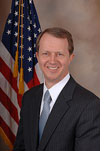 Congressman John Adler (Democrat, New Jersey), a member of the House Financial Services Committee: "Families and small businesses in New Jersey have to balance their budgets and Congress should be expected to do the same.This bill is a good start towards putting the federal government back on a path toward fiscal responsibility and long-term sustainability. However, we must go further and continue to eliminate wasteful government spending." Congressman John Adler (Democrat, New Jersey), a member of the House Financial Services Committee: "Families and small businesses in New Jersey have to balance their budgets and Congress should be expected to do the same.This bill is a good start towards putting the federal government back on a path toward fiscal responsibility and long-term sustainability. However, we must go further and continue to eliminate wasteful government spending."
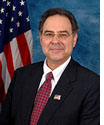 Congressman Paul Hodes (Democrat, New Hampshire): "We must not saddle our children and grandchildren with mounting debt. If we increase permanent spending, we must pay for it or our children and grandchildren will. In the short term, we had to respond to our economic emergency to protect jobs, reform health care, and create a new energy economy and new clean energy jobs, but after stabilizing the economy, we have to keep spending in check or our deficit will spiral out of control. This proposal will cap spending and make it against the law to establish permanent spending programs without a revenue source." Congressman Paul Hodes (Democrat, New Hampshire): "We must not saddle our children and grandchildren with mounting debt. If we increase permanent spending, we must pay for it or our children and grandchildren will. In the short term, we had to respond to our economic emergency to protect jobs, reform health care, and create a new energy economy and new clean energy jobs, but after stabilizing the economy, we have to keep spending in check or our deficit will spiral out of control. This proposal will cap spending and make it against the law to establish permanent spending programs without a revenue source."
 Congressman Steve Kagen, M.D.(Democrat, Wisconsin): “The federal government must live within its means just as we do around our kitchen tables in Wisconsin. This legislation is a necessary step to prevent our deficit from getting deeper. ... This is a necessary investment in our future. We will not be able invest in the changes we need like health care, education, and energy unless we reduce the deficit. As we take action to put our nation on the road to economic recovery, we are practicing fiscal responsibility to build a better future for all of us.” Congressman Steve Kagen, M.D.(Democrat, Wisconsin): “The federal government must live within its means just as we do around our kitchen tables in Wisconsin. This legislation is a necessary step to prevent our deficit from getting deeper. ... This is a necessary investment in our future. We will not be able invest in the changes we need like health care, education, and energy unless we reduce the deficit. As we take action to put our nation on the road to economic recovery, we are practicing fiscal responsibility to build a better future for all of us.”
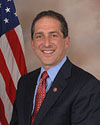 Congressman Ron Klein (Democrat, Florida): “Talk about a critical piece of common sense. At long last, Congress is now required to follow the same policy South Florida families live by: only spend a dollar if you can save a dollar somewhere else. It was long past time to restore some fiscal sanity to Washington .. Fiscal responsibility is one of my core personal values. It is what my wife and I teach our children, and it is what I believe should guide every decision we make in government. Today’s legislation marks a turning point in the fiscal health of our nation. It won’t happen overnight, but starting today, we will begin to turn the tide, cut our deficit and return to surpluses by only paying for what we can truly afford as a nation.” Congressman Ron Klein (Democrat, Florida): “Talk about a critical piece of common sense. At long last, Congress is now required to follow the same policy South Florida families live by: only spend a dollar if you can save a dollar somewhere else. It was long past time to restore some fiscal sanity to Washington .. Fiscal responsibility is one of my core personal values. It is what my wife and I teach our children, and it is what I believe should guide every decision we make in government. Today’s legislation marks a turning point in the fiscal health of our nation. It won’t happen overnight, but starting today, we will begin to turn the tide, cut our deficit and return to surpluses by only paying for what we can truly afford as a nation.”
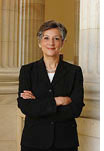 Congresswoman Allyson Schwartz (Democrat, Pennsylvania), House Budget Committee Vice Chair: “Pay-As-You-Go, or 'PAYGO,' rules are fairly straight-forward: Congress should pay for any new spending. There is a strong bipartisan history for PAYGO.In fact, in the 1990’s as a result of statutory PAYGO, this country saw record deficits transformed into surpluses. Sadly, when those statutory PAYGO provisions expired in 2002, the former Administration, with support from Congressional Republicans, ignored the common sense of paying for new spending – and turned our surplus into mounting national debt. But, Democrats are serious about fiscal responsibility. In 2007 the Democratically-controlled House set PAYGO rules, making a commitment to make any new spending budget neutral. And, this year we have agreed on the goal of cutting the annual deficit in half in 4 years. And now, with support from the current Administration, we are reinforcing our commitment to fiscal responsibility by giving PAYGO the force of law. As Vice-Chair of the House Budget Committee, I know how important it is to make wise, targeted investments for our future in energy, healthcare, and economic growth. And we must do so in a way that is deficit neutral. To do so, we must ensure that we pay for any new spending as we go.Statutory PAYGO is smart budgetary policy. It is common sense. And most importantly, it will help guarantee our nation’s financial security." Congresswoman Allyson Schwartz (Democrat, Pennsylvania), House Budget Committee Vice Chair: “Pay-As-You-Go, or 'PAYGO,' rules are fairly straight-forward: Congress should pay for any new spending. There is a strong bipartisan history for PAYGO.In fact, in the 1990’s as a result of statutory PAYGO, this country saw record deficits transformed into surpluses. Sadly, when those statutory PAYGO provisions expired in 2002, the former Administration, with support from Congressional Republicans, ignored the common sense of paying for new spending – and turned our surplus into mounting national debt. But, Democrats are serious about fiscal responsibility. In 2007 the Democratically-controlled House set PAYGO rules, making a commitment to make any new spending budget neutral. And, this year we have agreed on the goal of cutting the annual deficit in half in 4 years. And now, with support from the current Administration, we are reinforcing our commitment to fiscal responsibility by giving PAYGO the force of law. As Vice-Chair of the House Budget Committee, I know how important it is to make wise, targeted investments for our future in energy, healthcare, and economic growth. And we must do so in a way that is deficit neutral. To do so, we must ensure that we pay for any new spending as we go.Statutory PAYGO is smart budgetary policy. It is common sense. And most importantly, it will help guarantee our nation’s financial security."
Clinton, with Maliki, announces $100 million more in aid to Iraq
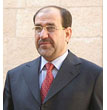 WASHINGTON, D.C. (Press Release)-- Following is the transcript of a joint press conference by U.S. Secretary of State Hillary Clinton and Iraq's Prime Minister Nouri Al-Maliki (at right), who earlier in his trip met with U.S. President Barack Obama. WASHINGTON, D.C. (Press Release)-- Following is the transcript of a joint press conference by U.S. Secretary of State Hillary Clinton and Iraq's Prime Minister Nouri Al-Maliki (at right), who earlier in his trip met with U.S. President Barack Obama.
SECRETARY CLINTON: Good afternoon. It is a pleasure to have this opportunity to meet with Prime Minister Maliki. We are continuing our work together to meet our goal of building a stable, sovereign and self-reliant Iraq. Our countries are on a long journey together, and obstacles, of course, remain, but we are making significant progress.
Today’s meeting was the second of the Strategic Framework Agreement Higher Coordinating Committee. This agreement establishes the terms of our relationship beyond security cooperation. We are working to promote economic growth and human development and diplomatic efforts so that Iraq can play a very constructive role not only at home, but throughout the region.
We have had six months of work together, so today, we reported on that work. And I’d like to thank Deputy Secretary Jim Steinberg and Ambassador Christopher Hill for their ongoing leadership of our Iraqi policy. Implementing the strategic framework agreement will be the focus of our work here at the State Department for months ahead.
I very much appreciate the positive contributions that the prime minister and his team made today. We will partner with the U.S. Chamber of Commerce to host the U.S.-Iraq Business and Investment Summit in October. And we’re going to work to make sure that the investment and business climate is very attractive. There are many important issues, but let me just highlight our education exchange. I want to commend Iraq for the $2.5 million it has recently put into the Fulbright student exchange program. We’re also working on justice issues to enhance law enforcement and strengthen the judicial and corrections systems. And we are also working to assist the Iraqi Government with the return of Iraqis who left their country but now wish to return home and be part of a new Iraq.
I am pleased to announce that the United States is contributing more than $100 million in new assistance this year to support the return and reintegration of displaced Iraqis. Again, thank you, Mr. Prime Minister, for your leadership.
PRIME MINISTER MALIKI: (Via interpreter) Thank you very much. I would like – in the name of God, the Merciful, the Compassionate, I would like to express my gratitude and thanks to you, Secretary Clinton, for your interest and your commitment to convene the second meeting for the Higher Coordination Committee as a part of the strategic framework agreement between us. And I thank you very much for managing this meeting and convening this meeting. There were so many ideas, commitments, principles, joint work ahead of us. All of us gives – all of that gives us the hope to look forward to a future that is bright for both.
The meeting that was convened today was a very strong launching to broaden the relationship under the strategic framework agreement that was signed between the two nations. Through the review and through the briefings that we heard during the meetings, there is tangible progress that actually happened and took place. But we also said that this is not enough. We still have to work more for more success and more achievements and cooperation throughout the various spheres that are covered in the bilateral relationship.
Madame Secretary, today’s meeting, it was a declaration in itself that we’re going into a new phase, from a previous phase of cooperation that focused on security and confronting terror and various groups into a phase where we expand our cooperation and relationship to economics, to trade, to higher education, to tourism, to every other sphere.
And I here would like to express my gratitude and thanks for the $100 million from the United States to support the efforts of the return of the Iraqis who left their places. And I am delighted by the level of seriousness and our agreement that the next meeting will be convened in Baghdad. And at the meantime, between now and the next meeting, all the various subgroups will continue their meetings in order to accelerate, in order to activate the various lines of cooperation.
And today’s meeting with the Chamber of Commerce, where a number of American businessmen and corporations came, I believe that was a very strong prelude to the upcoming conference that will be convened in October here in the United States, which will be the launching pad for a massive work in order to reconstruct Iraq, in order to invite investments, and in order to rebuild the country.
And tomorrow, also, we will be signing an educational initiative agreement which would allow us to send the first group of Iraqi students to the United States. We hope that we will be able, through that program, to send 10,000 Iraqi students to receive their education here. And I would like to express our thanks and gratitude to your cooperation, Madame Secretary, in allowing that American visas will be issued out of the American Embassy in Baghdad.
Thank you so much.
QUESTION: Madame Secretary, first, have you provided the prime minister with any clarification regarding the meeting that been held in Istanbul between American officials and Iraqi insurgents? And have you signed any protocol with the insurgents during that meeting? (Speaking in Arabic.)
SECRETARY CLINTON: Well, let me say that I –
INTERPRETER: Can I say to the prime minister in Arabic? Can I give him the question?
SECRETARY CLINTON: He was asked a question in Arabic.
INTERPRETER: Please.
SECRETARY CLINTON: Oh, okay.
INTERPRETER: (Speaking Arabic.)
SECRETARY CLINTON: Well, I have discussed this matter, which was only recently brought to my attention, with our Ambassador and with other officials. And we intend to make sure that the Iraqi Government is fully informed of any such activities, whether they are sponsored by another party or come from any other source. So we want to be sure that we have a very close working relationship and we have a very clear line of communication, and that’s what we intend to do going forward.
PRIME MINISTER MALIKI: (Speaking Arabic.)
QUESTION: Have you signed any (inaudible), Madame Secretary?
SECRETARY CLINTON: No, we have not authorized any to be signed.
STAFF: Elise.
INTERPRETER: One – just one second.
PRIME MINISTER MALIKI: (Via interpreter) In the spirit of bilateral cooperation and when the relationship between two parties who are equal and sovereign, I believe that constant dialogue – it’s very important in order to achieve the desirable outcome. I am quite satisfied on terms of what I heard on this issue. And I have been given a commitment that the Administration will not negotiate or reach any agreements with those who killed American soldiers, Iraqi soldiers, and Iraqi people.
QUESTION: But let me – can I --
SECRETARY CLINTON: No, no. We have to move on. I’m sorry.
QUESTION: Mr. Prime Minister, you came to Washington asking the Obama Administration for more political support in terms of helping Iraqis mediate over issues such as Kirkuk, between Arabs and Kurds, playing more of a mediative role on political reconciliation. Did you receive that political support? And are you satisfied that as the Obama Administration takes a military disengagement, that it will not undertake a political disengagement?
Go to top of right column
|
|
And Madame Secretary, if I might, on Honduras, President Zelaya is just feet from the Honduran border with Nicaragua. He seems to have a lot of cell phones in his hand, talking on the cell phone. Wondering if you had spoken to him and what you’re urging him in terms of his planned return into Honduras. Thank you.
PRIME MINISTER MALIKI: (Via interpreter) First of all, I am very satisfied, because what happened between Iraq and the United States is that we achieved an agreement regarding security arrangements and not disengaging. And if what was intended here is the withdrawal of forces from cities and towns, I see this as a manifestation of success, where their work would not be needed.
My visit here to the United States came in order to meet with the leadership here and strengthening the relationship with them, and also to activate the strategic framework agreement through a relationship of mutual cooperation, covering all other issues on the economic front, commercial front, education front, tourism, and so on.
And of course, within the spirit of friendship and cooperation, a number of critical issues were discussed. One of them is Iraq’s, under Chapter 7 and the various sanctions that were imposed on Iraq over the years, in addition to other bilateral issues. But we did not come specifically for any issues such as Kirkuk or anything else. And the issue of Kirkuk is an Iraqi issue. It will be settled among the Iraqis through the constitutions, through negotiations, through contacts, through dialogue, and it’s inevitable that we will reach an Iraqi solution to it.
SECRETARY CLINTON: Well, with respect to Honduras on the other side of the world, we support a negotiated, peaceful solution of the Honduran crisis. We have consistently urged all parties to avoid any provocative action that could lead to violence.
President Zelaya’s effort to reach the border is reckless. It does not contribute to the broader efforts to restore democratic and constitutional order in the Honduras crisis. So we urge President Zelaya and all other parties to reaffirm their commitment to a negotiated, peaceful solution to the integrity of Honduran democracy and the safety and well-being of the Honduran people. In fact, we urge both parties to accept the proposal put forth by President Arias. It is the basis for a peaceful solution, and that is what the United States supports.
QUESTION: Did you speak with him today?
SECRETARY CLINTON: Not today.
Thank you all very much.
PRIME MINISTER MALIKI: Thank you.
SECRETARY CLINTON: I’ve been speaking to Prime Minister Maliki today.
Clinton, Fayyad in joint global news conference tout Palestinians' fiscal responsibility
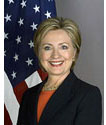 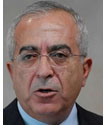 WASHINGTON, D.C. (Press Release) —Following is the transcript of a television broadcast Friday, July 24, featuring U.S. Secretary of State Hillary Clinton in Washington, D.C. and Palestine Authority Prime Minister Salam Fayyad in Ramallah. WASHINGTON, D.C. (Press Release) —Following is the transcript of a television broadcast Friday, July 24, featuring U.S. Secretary of State Hillary Clinton in Washington, D.C. and Palestine Authority Prime Minister Salam Fayyad in Ramallah.
MR. CROWLEY: Good afternoon from Washington, and good evening to our friends in Ramallah. Here in Washington we are joined by the Secretary of State Hillary Clinton, and in Ramallah by Palestinian Authority Prime Minister Salam Fayyad. We’ll begin the program with Secretary Clinton and then follow by remarks by the prime minister.
SECRETARY CLINTON: Thank you very much. Welcome, and I’m delighted to be able to speak via technology on this important issue. I know that Prime Minister Fayyad and our Consul General in Jerusalem, Jake Wallace, and others are joining us from Ramallah. I want to thank you for taking the time to meet with us. And I express – especially appreciate, Mr. Prime Minister, that you and your colleagues agreed to do this late on Friday evening, which I know is not convenient, to allow me to participate once I returned to Washington from Asia.
I wanted personally to announce the delivery of budget support to the Palestinian Authority, under the leadership of President Abbas and Prime Minister Fayyad. Because what is at stake for the Palestinian people, for the future of a Palestinian state, for the future security of Israel, and for the region is so critical. This is important also to the United States and the Obama Administration. Finding a peaceful solution to the Israeli-Palestinian conflict and the broader conflict that has plagued the Middle East for decades has been a priority for the President and me from the very beginning of the Administration.
I am pleased that Senator George Mitchell, our Special Envoy for Middle East Peace, is back in the region. And I believe we are making progress in our efforts to create the environment for a successful resumption of negotiations in the near future. As I said at Sharm el-Sheikh, human progress depends on the human spirit. The broader goals we seek to accomplish – a comprehensive Arab-Israeli agreement and a two-state solution – are more likely to grow out of opportunity than futility, out of hope rather than misery.
As I also said, the point of our engagement is to help the parties make the decisions that are in their best interests. And it is our hope that the support of the United States and other nations will help foster conditions in which a Palestinian state can be fully realized, a state that is a responsible partner, is at peace with Israel and its Arab neighbors, accountable to its people, a state that Palestinians everywhere can be proud of and that will be respected worldwide.
This shared goal depends on strengthening the Palestinian Authority and its ability to meet the needs of its people. In just over two years, President Abbas and Prime Minister Fayyad have put in place the foundations of a responsible, transparent, accountable government. Therefore, I am pleased to announce that the United States has transferred $200 million in direct support to the Palestinian Authority. This transfer fulfills a critical portion of the assistance package that I announced in March in Sharm el-Sheikh. The ability of the United States to provide support directly to the Palestinian Authority is an indication of the bipartisan support for the effort to secure the peace in the Middle East, as well as for the fundamental reforms that the Palestinian Authority has undertaken. Members of Congress from both sides of the aisle worked closely with us to make this assistance possible.
An important marker of progress is that the Palestinian Authority now has systems in place to ensure that donor funds are handled transparently and in an accountable manner. We will continue to work with the Palestinian leadership to bolster these safeguards to make sure that the funding ends up exactly where – and for whom – it is intended.
But we are confident, because the Palestinian Authority, under President Abbas and Prime Minister Fayyad, has a very exceptional two-year track record of performance on economic reform and prudent financial management, as noted by the World Bank, the IMF, and our own internal reviews. These fiscal reforms serve a larger purpose. We are seeing the positive impact that responsible government is having on the lives of Palestinians in the West Bank, daily improvements in security, law and order, and economic opportunities.
For these improvements to take root, the capacity of the PA must be both deepened and strengthened. To continue this impressive record of reform, the PA needs financial help, and they need it now. President Abbas and Prime Minister Fayyad have worked hard to lower the burden on donors, but continued progress will depend on donors meeting their commitments. The United States has and will continue to be a partner with the Palestinian people for peace, prosperity, and security.
Now many other nations, including our European partners, have contributed generously to support the PA. I call on all nations that wish to see a strong, viable Palestinian state living in peace and security with its neighbors to join us in supporting the Palestinian Authority. The Palestinian Authority has proven to be a reliable partner for peace. It offers the Palestinian people the option of a peaceful, free, and prosperous future, and an end to the violence and conflict that have deprived so many Palestinians of the opportunity to fulfill their hopes and dreams and for their children to live up to their God-given potential.
So these are the goals we seek to accomplish: a comprehensive Arab-Israel peace agreement and a two-state solution. And it is our hope that this support will further conditions in which a Palestinian state can be realized.
I’m very grateful for the changes and reforms that have been instituted in the Palestinian Authority, and I look forward to continuing to work with President Abbas and Prime Minister Fayyad on moving forward with these extremely important and critical goals. Thank you very much.
PRIME MINISTER FAYYAD: Thank you very much. Thank you, Madame Secretary, for taking the time to be with us today to take part in a very important event. Indeed, it is a hugely important event on at least three counts. For one, $200 million assistance package of yours represents the largest amount of external financial assistance to be made available to the Palestinian Authority in a single tranche by any donor toward any purpose since the inception of the PA, Palestinian Authority.
Second, the entire amount assistance is earmarked for budget support – the very type of external assistance we need the most, particularly at this juncture, given the severe financial difficulties that we have been facing for many months now. So your assistance couldn’t have been more timely, and it will enhance our capacity to deliver vital and needed services to our people in Gaza and in the West Bank. For all of this, we are grateful to you, Madame Secretary.
In this case, our sense of deep gratitude is matched, if not even surpassed by the by immense pride in what we have accomplished – to be worthy of the confidence of our people and the international community in the legitimacy of our financial management system. Given the very high and indeed exacting standards of accountability and transparency set forth by the U.S. Congress of aid disbursement, the fact that you have chosen to disburse the full $200 million directly to our treasury carries with it a clear signal amount of confidence in our financial systems and our financial management.
It is indeed a huge vote of confidence and one which we deeply cherish. Madame Secretary, any aid receiving country would be proud to qualify for your assistance being delivered directly to its treasury. For us Palestinians, it takes on added significance, given what it implies, in terms of our readiness for statehood and the fulfillment of our ultimate goal of living in freedom and dignity in a country of our own.
So, Madame Secretary, on behalf of President Abbas, the Palestinian National Authority, and the Palestinian people, I thank you personally. I also would like to thank President Obama, the U.S. Congress, and of course, the American people. Thank you so very much.
SECRETARY CLINTON: Thank you very much, Prime Minister Fayyad, and I just want to underscore how much we appreciate all of the steps and changes that your government has undertaken. Thank you very much.
PRIME MINISTER FAYYAD: (Inaudible), thank you.
SECRETARY CLINTON: I think we’ll take a question or two. Is that okay, Jake?
STAFF: Yes.
SECRETARY CLINTON: On this subject. Yes.
QUESTION: Madame Secretary, we’ve heard from Maliki, and perhaps Prime Minister Fayyad can speak to this as well, that as you’re – as you say, you’re making progress in creating the conditions for negotiations, that they’d like to see the Obama Administration make some kind of declaration or vision statement in terms of how you see the negotiations taking place, and your vision for a Middle East settlement so that that perhaps could, you know, get the parties onboard in terms of moving forward, that that’s what you need, and they want you to do it before Ramadan.
Do you anticipate any statement of this nature? Do you think that the Obama Administration will lay out its vision before the negotiations resume? And – because Senator Mitchell had said that he thought it would be done in weeks, not months, and we’re kind of approaching months at this point.
SECRETARY CLINTON: Well, this is one step at a time. And as you know, Senator Mitchell is back in the region having further consultations and exploring, in depth, some of the actions that are being considered. He will be in Israel in a few days, and we’re going to let the parties continue to drive this process because we want to get back to the negotiations between the two of them. The final status issues, which are obviously very important, can only be resolved by agreement between the Palestinian Authority and the Israelis. So at this point, we’re working very hard to get to that step and then we’ll see where we go from there.
Yeah.
QUESTION: Could you be a bit more specific, though, as to when you think these negotiations could begin? Are you making any progress, for example, on the settlement issues? That seems to be the key issue that’s holding this up. Are you expecting Senator Mitchell to come back with something special, something resolved there?
SECRETARY CLINTON: Well, I’m not going to preempt Senator Mitchell. He is the person conducting these consultations on behalf of the President and myself. Obviously, this is very complicated work. There are lots of moving parts. So I think we’ll wait until there is some announcement to be made, and then once that happens, it will be, obviously, right to ask questions about it. But let’s let Senator Mitchell continue the important work that he’s doing.
MR. CROWLEY: Perhaps one or two more and then --
SECRETARY CLINTON: Okay. Okay, yeah.
QUESTION: Okay. Madame Secretary, a large number of senior American officials are going to Israel next week to talk with senior Israeli officials. I wonder if the Administration has decided maybe this is a good time to try to ratchet down some of the tensions with the Israelis over the issues that are being discussed, led by the settlements.
SECRETARY CLINTON: Well, when we talk with the Israelis, they are conversations between friends. I mean, we have a deep and durable relationship with Israel. It has been our commitment, no matter who is in the White House and no matter who is the prime minister in Israel. So I think that the conversations that we’re engaged in with our Israeli counterparts are very forthright, very clear that we have to work through a lot of the concerns that are expressed. Our goal is to ensure a peaceful and secure future for the Israeli people and future generations of Israelis.
So I think that there is a great deal of positive communication that is taking place. And it’s not only on the issues that Senator Mitchell is driving, but we have many interests and concerns with the Israelis that will be explored and discussed when General Jones and his delegation arrive there.
Yeah.
QUESTION: Madame Secretary, Senator Mitchell is going to Syria. Do you expect that you can make progress on the Syrian-Israeli track before the Palestinian-Israeli track?
SECRETARY CLINTON: Again, I think this is one of the issues that is being explored. As you know, we began a policy of reengaging Syria when I became Secretary of State, and working with our teams here, Jeff Feltman and others from the State Department and the White House. And we think that it’s a fruitful engagement that we intend to pursue. We have notified the Syrians that we are returning an ambassador to Damascus.
But it is just the beginning. I mean, I don’t want to leapfrog over the hard work that has to be done in working through many of the issues that are of great concern to the United States that Syria has to be willing to discuss with us and, hopefully, make some changes going forward.
So as we move through this process, we obviously will be informing you as to where we are. But I think the question of either/or track – Senator Mitchell is exploring deeply with the Syrians how they would respond to renewed negotiations with the Israelis. The timing on that, the simultaneity of it; that’s all to be determined.
Yeah, go ahead.
MR. CROWLEY: One more?
SECRETARY CLINTON: Yeah.
QUESTION: Thank you. Following up on this track, on the Syrian track and also Senator Mitchell’s visit, importantly, for a solution to be viable, other Palestinian actors will have be to involved. Syria has important sway with Hamas and other Palestinian factions. So what do you expect from the Syrians on that track, and how important is it for national unity between the Palestinians? Thank you.
SECRETARY CLINTON: Well, of course, the Palestinians themselves have been, as you know, meeting in Cairo over a number of months to discuss some of the challenges to unity, and I leave that to them to describe, because there are internal dynamics that have nothing to do with any other party. It’s between them.
But with respect to Hamas being a part of any negotiations, we’ve set forth the conditions that would be necessary for Hamas to meet. And they’re conditions that not only do we support, but the Quartet -- the UN, EU, United States, and Russia – support, and the Palestinian Authority supports. I mean, the Palestinian Authority is working very hard, as evidenced by their reform efforts, the changes that they’ve instituted, to try to be a responsible and effective partner with Israel in any peace negotiations going forward.
So they don’t want someone at the table who doesn’t even agree with the purpose of the negotiations. So the conditions are clear – Hamas has to renounce violence, recognize Israel, and agree to the enforcement of prior agreements that have been entered into by the Palestinian Authority.
That hasn’t yet come to pass. But I think the path forward for Hamas is very clear. If the Syrians or anyone else can persuade them to take a positive path forward, well, clearly, I think the Palestinian Authority and others would welcome that. But at this moment, that is not yet their position.
QUESTION: Madame Secretary, thank you very much.
SECRETARY CLINTON: Thank you all very much. I leave you in the good hands of P.J. And I don’t see anybody who was on that trip with me. (Laughter.)
QUESTION: (Inaudible.)
SECRETARY CLINTON: Oh, well, I mean, gosh, I was just looking to see who (inaudible). (Laughter.) Thank you all.
MR. CROWLEY: We can say for the record, she got off the airplane, came straight to the office. (Laughter.)
The United States is committed to improving the humanitarian situation in Gaza. In 2009, the United States has provided more than $72 million to date in humanitarian assistance to the people of Gaza through the United Nations Consolidated Appeal (CAP) and other partner organizations.
In 2008, the U.S. was the single largest national donor to the Palestinian Authority. The U.S. exceeded its Paris Donors’ Conference pledge of $555 million (December 2007), committing more than $600 million in assistance to the PA in calendar year 2008, including:
· $239 million for activities in economic growth, democracy and governance, food assistance, education, health, and water supply to the PA.
· An additional $300 million in direct budget support to the PA for debt owed to commercial vendors and financial institutions.
· $75 million for security sector reform.
In addition, in fiscal year 2008 the U.S. provided $184.7 million in Migration and Refugee Assistance (MRA) and Emergency Refugee and Migration Assistance (ERMA) funds to United Nations Relief and Works Agency (UNRWA) for assistance to Palestinian refugees in the West Bank, Gaza, Jordan, Lebanon, and Syria.
WASHINGTON, D.C. (Press Release)--Following are the Middle East portions of a news briefing conducted in Washington on Friday, July 24, by Phillip Crowley, an assistant secretary of state.
MR. CROWLEY: Just a few announcements: we’ll have a fact sheet for you this afternoon that goes through in some detail the issues of the $200 million in assistance that the Secretary and the prime minister just talked about.
Clearly, you’ll see the Secretary again this afternoon in a couple of hours. She will, of course, host Prime Minister Nouri al-Maliki for a bilateral discussion and the – a meeting of the – the first meeting of the – in-person meeting of the U.S.-Iraq Strategic Framework Agreement Higher Coordinating Committee. There was a meeting that took place via video conference right at the end of the Bush Administration, hosted by -- or led by Secretary Rice. But this is the first time that the groups will get together in person, and there will be a variety of discussions on economic issues, investment, (inaudible) to broaden the frame of the U.S-Iraqi relationship, moving towards the Strategic Framework Agreement that the two countries have committed to.
The Secretary mentioned George Mitchell. He met today with the crown prince and foreign minister in Abu Dhabi, and will arrive in Damascus tomorrow for a meeting with President Asad on Sunday. Then Sunday, he will travel to Jerusalem. While there, he will meet with Prime Minister Netanyahu, Defense Minister Barak. He will also, of course, meet with President Abbas and Prime Minister Fayyad....
QUESTION: Quickly, on the Asad meeting. Is this the first meeting with Asad? Would – did he meet with him last time?
MR. CROWLEY: I think he – they’ve met before.
QUESTION: Okay, they have.
MR. CROWLEY: But obviously, it will be not only as the Secretary described, looking at where we stand on a comprehensive peace agreement, it will include the Syrian track. They’ll talk about the range of bilateral issues as well, including our joint interests in a stable Iraq.
**
Yes.
QUESTION: Janine Zacharia of Bloomberg.
MR. CROWLEY: Hi.
QUESTION: The Secretary said you’re sending an ambassador back to Syria. Has that person been named, and when are they going back?
MR. CROWLEY: We have agreed with the Syrians to return an ambassador. We obviously have to go through the confirmation process, which means announcing a candidate and then having them formally nominated, and go through the confirmation process. So I think it’ll be still some time to accomplish that.
**
QUESTION: And can I just ask, back on the Middle East, can you just – I know we’re getting fact sheet later. This $200 million is money that she pledged in March in Sharm el-Sheikh?
MR. CROWLEY: This is part of the tranche. I think roughly speaking, she made a $900 million pledge in Sharm el-Sheikh earlier this year. I think this tranche brings us about halfway through that.
QUESTION: Also on the Middle East, is this Senator Mitchell’s first meeting with Asad or did he meet --
MR. CROWLEY: I don’t think so. I think they’ve met before.
QUESTION: He did meet with him last time? Thanks.
MR. CROWLEY: This is his second trip to Damascus that I --
QUESTION: I just asked.
QUESTION: You already did?
QUESTION: Yeah.
QUESTION: Sorry.
QUESTION: She doesn’t listen to my questions.
QUESTION: No, I’m still on vacation mode. I’m sorry about that.
MR. CROWLEY: (Laughter.) Yes.
QUESTION: (Inaudible) newspaper. I just wanted to ask you about the significance of his visit to the Emirates today. I mean, I know that he’s seen other countries, you know, other leaders in the region. But what is the significance of the Emirates visit?
MR. CROWLEY: Well, obviously, as I think the Secretary has pointed out, we need action by all parties in this process. The Israelis have responsibilities, the Palestinians have responsibilities, other nations in the region have responsibilities. As I think I’ve already mentioned, he’ll be going to Egypt on this trip. He’ll also be going to Bahrain.
But we’re touching base with leaders on every trip just to make clear that as this process goes forward, one of the critical elements we’ll need will be making sure that there is support in the region for the difficult decisions and compromises that are going to have to be made if and when we do get into formal negotiations.
QUESTION: Have you reached any agreement with the Israelis on the settlement issue?
MR. CROWLEY: I’m sure that will be a subject of Senator Mitchell’s meetings on Sunday.
QUESTION: P.J., when Mitchell was in here a couple of weeks ago, he seemed to have – be a little more forward-leaning about the progress that’s been made, and that didn’t seem to come through with the Secretary’s comments today. How far apart are you on the settlements issue?
MR. CROWLEY: Well, no, I think, as the Secretary said, we’re having very earnest negotiations with all of the parties, and we’re making sure that we can have clear understandings of where we are, and in doing so, create the conditions that allow a negotiating process to begin. And then obviously, once you’re in a negotiation process, there are clear issues that will have to be resolved, and many of those need to be resolved as part of final status negotiations.
So I think he wants to be clear that all sides are creating the conditions, putting themselves in positions so that when we begin a formal negotiating process, we’ve put ourselves in the best position to have a successful outcome.
QUESTION: Would you say he’s encouraged by the talks?
MR. CROWLEY: Well, I would say that he continues his efforts to create those conditions, as he said when he was here, for a negotiation to begin. As I recall, I don’t think he put a timetable on this, but obviously said we want to do this as soon as possible.
**
QUESTION: New topic. The Secretary talked a bit about Iran in an interview yesterday. She said the Iranians appear to be unable to, you know, make a decision about the American diplomatic overture. And I wonder whether the Administration’s thinking on this September deadline is evolving at all, given that there’s this political turbulence within Iran now.
MR. CROWLEY: I think, as the Secretary said – I think she used the term “capacity” – is right now, there does not seem to be a capacity within Iran to be able to significantly respond to the offer of engagement that we have made in a number of different frames. We’ll have to wait and see where Iran is and at what time they determine that they can kind of give us an indication of what they are either willing to or are able to do.
Obviously, from our standpoint, there are a number of possibilities. We’ve talked repeatedly about the importance of the P-5+1 process. That will be one opportunity. But there are other avenues for engagement and potentially for cooperation in the context of Afghanistan and, of course, bilateral. But the ball is clearly in Iran’s court, and obviously, right now, the government has its hands full.
**
QUESTION: On Iraq, I just wanted to ask you if there was any follow-up regarding the Iraqi cabinet’s statement that they would be sending an official letter to the American Embassy and the Turkish Embassy regarding this so-called secret protocol. Did your embassy actually receive a letter thus far regarding this?
And the Iraqis have said they’re asking clarification from Americans, so is there going to be verbal clarification, anything written? What’s the story on that one?
MR. CROWLEY: I can’t tell you if we have received a formal letter regarding this issue. Obviously, it has received some public attention. And from a U.S. standpoint, the meetings that may be the subject of – had occurred some months ago, part of a broad dialogue that diplomatic and military officials have with a wide range of interested parties in Iraq. And as we understand it, the meetings did occur with the knowledge of officials within the Iraqi Government.
But obviously, to the extent that there are views in Iraq that this is somehow undercutting the Iraqi Government, from our standpoint, clearly, we have a great deal invested in the relationship between the United States and Iraq and we would do nothing to undercut that.
**
QUESTION: On a different topic, are you aware if there’s been any international law violated in relation to the American citizens involved in the New Jersey scandal with the black market (inaudible) they’re running?
MR. CROWLEY: Try me again.
QUESTION: Are you aware of any international law violations also being brought with the allegations involving the New Jersey black markets --
MR. CROWLEY: I’ve seen the report of the arrests. But beyond that, I think we’ll wait for the investigation to proceed.
|

